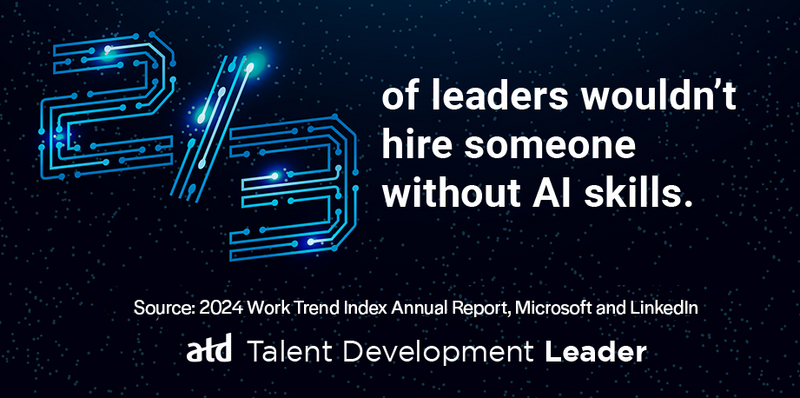Talent Development Leader
Wanted: Workers With AI Skills
Not only are artificial intelligence roles and skills needs increasing, employers also require them.
Mon Jun 17 2024

Most organizations expect artificial intelligence technology to affect their talent strategies within two years, according to Deloitte’s latest State of Generative AI in the Enterprise report_, Now Decides Next: Getting Real About Generative AI._ Of the 1,982 leaders surveyed, four in 10 expect AI to increase head count, while two in 10 anticipate a decrease in staff due to AI.
The report states that the most expected impact on talent strategy revolves around upskilling or reskilling because generative AI can increase the value of both technology- and human-centered skills. Respondents said that the technology-centered skills they expect to increase the most in value include data analysis and information research. Human-centered skills that respondents believe will most increase in value include critical thinking and problem solving, creativity, flexibility/resilience, and the ability to work in teams.
“On the front end, organizations need valuable and scarce talent with expertise in Generative AI to develop and refine their solutions. They also need the overall workforce to be comfortable enough with the technology to be willing to use it for improving efficiency and effectiveness,” notes Deloitte in the report.

To help leaders and organizations understand how AI will reshape the labor market, Microsoft and LinkedIn’s 2024 Work Trend Index Annual Report, AI at Work Is Here. Now Comes the Hard Part, identifies hiring trends and analyzes trillions of productivity signals as well as research from Fortune 500 companies.
The index reveals that, while AI and job loss are top of mind for many employees, there’s also “massive opportunity for those willing to skill up on AI.”
According to the findings, organizations are hiring AI-specific roles, with more than half saying they’re concerned about having enough talent to fill roles in the year ahead. And while many employers “have already made their landgrab for technical AI talent … now they’re turning their sights to non-technical talent with AI aptitude.”
LinkedIn job posts that mention AI or generative AI have increased by 17 percent during the past two years, compared to job posts that don’t mention either. Further, 22 percent of recruiters said they’re updating job descriptions to reflect the role’s usage of generative AI.
The 2024 Work Trend Index also discovered that two-thirds of leaders wouldn’t hire someone without AI skills—they would rather hire a less experienced candidate with AI skills than a more experienced candidate without those skills. That’s good news for young workers, because 77 percent of leaders note that “with AI, early-in-career talent will be given greater responsibilities.”
Microsoft and LinkedIn conclude that future-looking organizations are hiring people with AI skills to fill the talent gap as well as taking action to reskill and upskill the existing workforce. For instance, many employers on LinkedIn’s 2024 list of Best Companies for Professional Growth, such as JPMorgan Chase, Procter & Gamble, and AT&T, offer their teams AI-focused learning opportunities to drive transformation at scale.
Deloitte’s research concurs. “In today’s extremely competitive market for AI talent, organizations are not only aggressively pursuing new talent, but also training their broader workforces on Generative AI,” says the State of Generative AI report.
Read more from Talent Development Leader.
